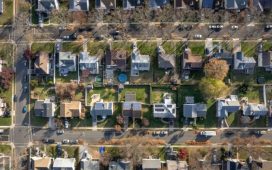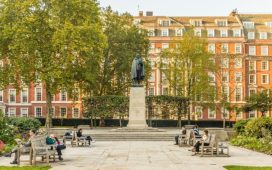Unlock the Editor’s Digest for free
Roula Khalaf, Editor of the FT, selects her favourite stories in this weekly newsletter.
Fixing the fire safety issues identified after the Grenfell blaze will take another three to five years, according to the chief executive of one of the UK’s largest housebuilders.
Barratt, like other major developers, has said it will remediate faults in its buildings but its chief executive David Thomas said the pace of work was constrained by practical issues, such as the number of qualified fire engineers.
“We recognise that this will take another three to five years to work through to resolution,” Thomas said. “There are resource constraints, an example would be fire engineers.”
His comments, speaking as the company reported full-year results, come ahead of the publication of the final report of the Grenfell Tower Inquiry on Wednesday and underscore the huge scale of the work still required to make UK buildings safe, seven years after the fire.
People suffering the anxiety of living in blocks with dangerous cladding also often face huge insurance bills and problems selling or borrowing against their properties. Residents have clashed with developers over the scope and speed of remediation work.
The risk of these buildings was highlighted again by a fire at a block in Dagenham last week, where work was under way to remove cladding.
Following the 2017 Grenfell fire in Kensington, London, that killed 72 people, thousands of buildings with fire safety problems were identified across the country.
Work has yet to start on more than half of the buildings that big developers have agreed to remediate, according to government statistics. Campaigners and residents say the companies are moving too slowly, and sometimes try to minimise the scope of the work.
Industry groups have pointed to the complex and lengthy legal process around building safety, as well as logjams at government bodies like the Building Safety Regulator — on top of supply chain constraints and shortages of qualified workers.
Within its building portfolio, Barratt said it had identified another 26 buildings that might need remediation in the year to June, while 42 buildings were either successfully remediated or found not to require work.
The company took a £126mn charge for fire safety during the year, with its total provision reaching £628mn. It also took a £57mn provision after identifying “structural issues” related to reinforced concrete at two more developments.
Developers and landlords have been dealing with issues from reinforced autoclaved aerated concrete (Raac) after fears about the building material led to the closure of more than a hundred schools last year.
Barratt also reported an 18.6 per cent decline in new home completions, in line with expectations. Its profits before tax dropped to £170.5mn in the year to June, from £705mn a year before, as it warned new home completions would not recover in the coming financial year.










